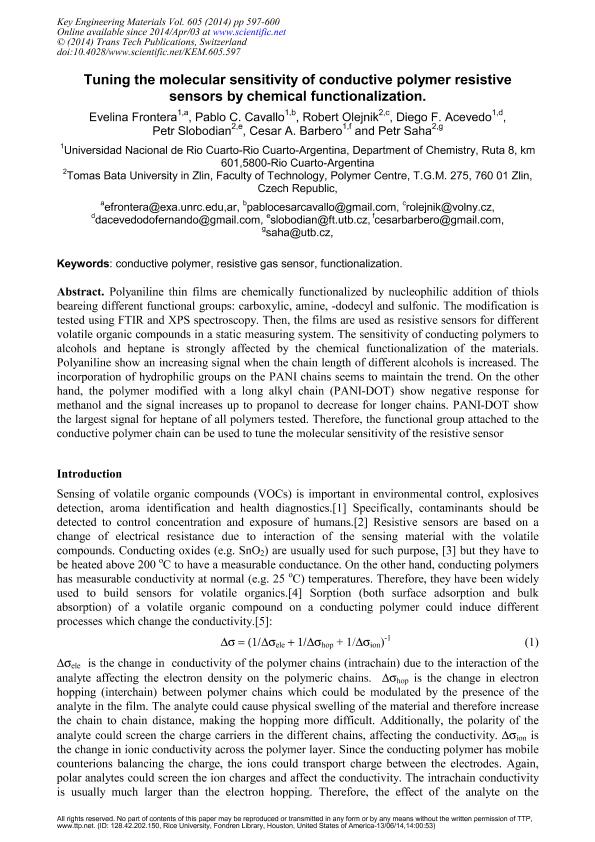Mostrar el registro sencillo del ítem
dc.contributor.author
Frontera, Evelina

dc.contributor.author
Cavallo, Pablo César

dc.contributor.author
Olejnik, Robert
dc.contributor.author
Acevedo, Diego Fernando

dc.contributor.author
Slobodian, Petr
dc.contributor.author
Barbero, César Alfredo

dc.contributor.author
Saha, Petr
dc.date.available
2018-01-19T18:30:41Z
dc.date.issued
2014-04
dc.identifier.citation
Frontera, Evelina; Cavallo, Pablo César; Olejnik, Robert; Acevedo, Diego Fernando; Slobodian, Petr; et al.; Tuning the Molecular Sensitivity of Conductive Polymer Resistive Sensors by Chemical Functionalization; Evangelos Hristoforou and D.S. Vlachos; Key Engineering Materials; 605; 4-2014; 597-699
dc.identifier.issn
1013-9826
dc.identifier.uri
http://hdl.handle.net/11336/33977
dc.description.abstract
Polyaniline thin films are chemically functionalized by nucleophilic addition of thiols beareing different functional groups: carboxylic, amine, -dodecyl and sulfonic. The modification is tested using FTIR and XPS spectroscopy. Then, the films are used as resistive sensors for different volatile organic compounds in a static measuring system. The sensitivity of conducting polymers to alcohols and heptane is strongly affected by the chemical functionalization of the materials. Polyaniline show an increasing signal when the chain length of different alcohols is increased. The incorporation of hydrophilic groups on the PANI chains seems to maintain the trend. On the other hand, the polymer modified with a long alkyl chain (PANI-DOT) show negative response for methanol and the signal increases up to propanol to decrease for longer chains. PANI-DOT show the largest signal for heptane of all polymers tested. Therefore, the functional group attached to the conductive polymer chain can be used to tune the molecular sensitivity of the resistive sensor
dc.format
application/pdf
dc.language.iso
eng
dc.publisher
Evangelos Hristoforou and D.S. Vlachos
dc.rights
info:eu-repo/semantics/openAccess
dc.rights.uri
https://creativecommons.org/licenses/by-nc-sa/2.5/ar/
dc.subject
Conductive Polymer
dc.subject
Functionalization
dc.subject
Resistive Gas Sensor
dc.subject.classification
Recubrimientos y Películas

dc.subject.classification
Ingeniería de los Materiales

dc.subject.classification
INGENIERÍAS Y TECNOLOGÍAS

dc.title
Tuning the Molecular Sensitivity of Conductive Polymer Resistive Sensors by Chemical Functionalization
dc.type
info:eu-repo/semantics/article
dc.type
info:ar-repo/semantics/artículo
dc.type
info:eu-repo/semantics/publishedVersion
dc.date.updated
2018-01-18T21:02:05Z
dc.journal.volume
605
dc.journal.pagination
597-699
dc.journal.pais
Suiza

dc.journal.ciudad
Durnten
dc.description.fil
Fil: Frontera, Evelina. Consejo Nacional de Investigaciones Científicas y Técnicas; Argentina. Universidad Nacional de Río Cuarto; Argentina
dc.description.fil
Fil: Cavallo, Pablo César. Consejo Nacional de Investigaciones Científicas y Técnicas; Argentina. Universidad Nacional de Río Cuarto; Argentina
dc.description.fil
Fil: Olejnik, Robert. Tomas Bata University in Zlin; República Checa
dc.description.fil
Fil: Acevedo, Diego Fernando. Consejo Nacional de Investigaciones Científicas y Técnicas; Argentina. Universidad Nacional de Río Cuarto; Argentina
dc.description.fil
Fil: Slobodian, Petr. Tomas Bata University in Zlin; República Checa
dc.description.fil
Fil: Barbero, César Alfredo. Consejo Nacional de Investigaciones Científicas y Técnicas; Argentina. Universidad Nacional de Río Cuarto; Argentina
dc.description.fil
Fil: Saha, Petr. Tomas Bata University in Zlin; República Checa
dc.journal.title
Key Engineering Materials

dc.relation.alternativeid
info:eu-repo/semantics/altIdentifier/url/https://www.scientific.net/KEM.605.597
dc.relation.alternativeid
info:eu-repo/semantics/altIdentifier/doi/http://dx.doi.org/10.4028/www.scientific.net/KEM.605.597
Archivos asociados
